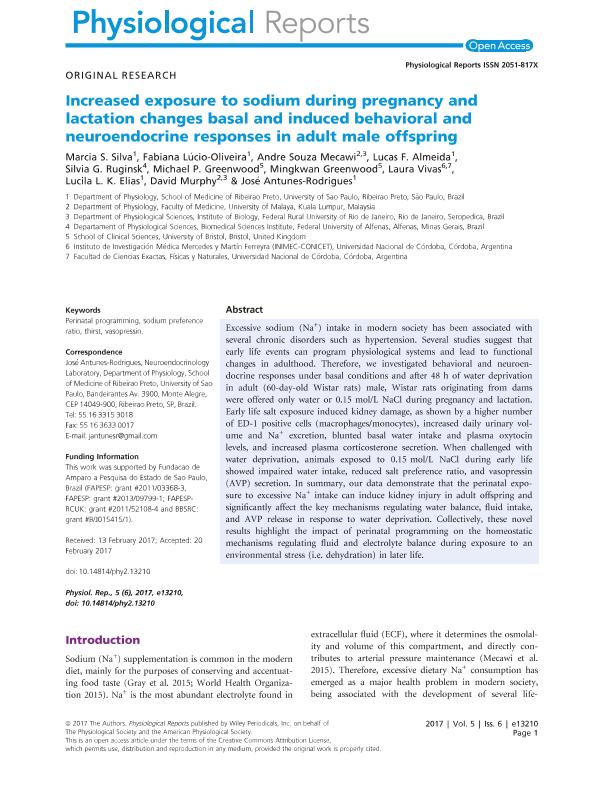Artículo
Increased exposure to sodium during pregnancy and lactation changes basal and induced behavioral and neuroendocrine responses in adult male offspring
Silva, Marcia S.; Lúcio Oliveira, Fabiana; Mecawi, Andre Souza; Almeida, Lucas F.; Ruginsk, Silvia G.; Greenwood, Michael P.; Greenwood, Mingkwan; Vivas, Laura Marta ; Elias, Lucila L. K.; Murphy, David; Antunes Rodrigues, José
; Elias, Lucila L. K.; Murphy, David; Antunes Rodrigues, José
 ; Elias, Lucila L. K.; Murphy, David; Antunes Rodrigues, José
; Elias, Lucila L. K.; Murphy, David; Antunes Rodrigues, José
Fecha de publicación:
29/03/2017
Editorial:
American Physiological Society
Revista:
Physiological Reports
ISSN:
2051-817X
Idioma:
Inglés
Tipo de recurso:
Artículo publicado
Clasificación temática:
Resumen
Excessive sodium (Na+) intake in modern society has been associated with several chronic disorders such as hypertension. Several studies suggest that early life events can program physiological systems and lead to functional changes in adulthood. Therefore, we investigated behavioral and neuroendocrine responses under basal conditions and after 48 h of water deprivation in adult (60-day-old Wistar rats) male, Wistar rats originating from dams were offered only water or 0.15 mol/L NaCl during pregnancy and lactation. Early life salt exposure induced kidney damage, as shown by a higher number of ED-1 positive cells (macrophages/monocytes), increased daily urinary volume and Na+ excretion, blunted basal water intake and plasma oxytocin levels, and increased plasma corticosterone secretion. When challenged with water deprivation, animals exposed to 0.15 mol/L NaCl during early life showed impaired water intake, reduced salt preference ratio, and vasopressin (AVP) secretion. In summary, our data demonstrate that the perinatal exposure to excessive Na+ intake can induce kidney injury in adult offspring and significantly affect the key mechanisms regulating water balance, fluid intake, and AVP release in response to water deprivation. Collectively, these novel results highlight the impact of perinatal programming on the homeostatic mechanisms regulating fluid and electrolyte balance during exposure to an environmental stress (i.e. dehydration) in later life.
Palabras clave:
Perinatal Programming
,
Sodium Preference Ratio
,
Thirst
,
Vasopressin
Archivos asociados
Licencia
Identificadores
Colecciones
Articulos(INIMEC - CONICET)
Articulos de INSTITUTO DE INV. MEDICAS MERCEDES Y MARTIN FERREYRA
Articulos de INSTITUTO DE INV. MEDICAS MERCEDES Y MARTIN FERREYRA
Citación
Silva, Marcia S.; Lúcio Oliveira, Fabiana; Mecawi, Andre Souza; Almeida, Lucas F.; Ruginsk, Silvia G.; et al.; Increased exposure to sodium during pregnancy and lactation changes basal and induced behavioral and neuroendocrine responses in adult male offspring; American Physiological Society; Physiological Reports; 5; 6; 29-3-2017; 1-13
Compartir
Altmétricas



